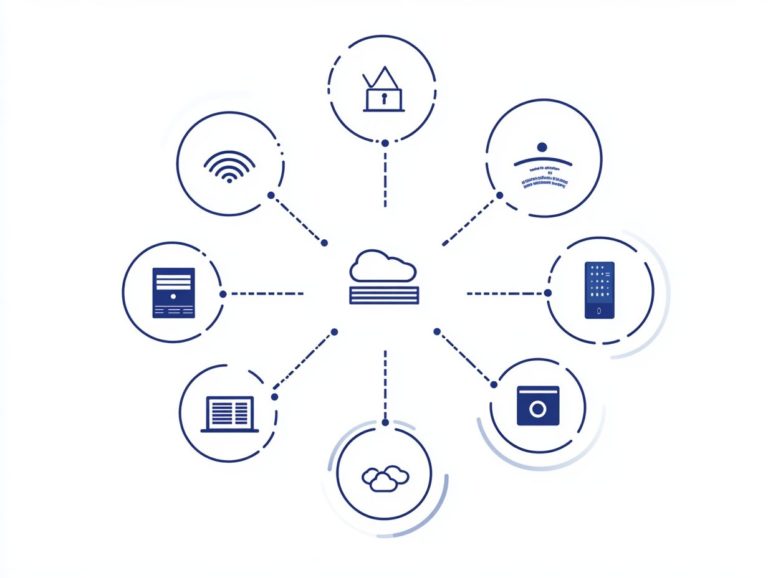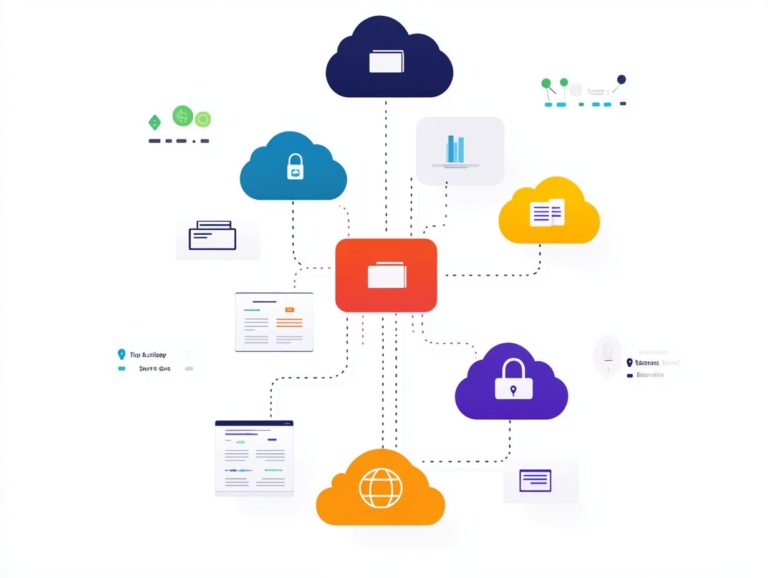5 Cloud Providers with Strong Data Privacy Policies
In today s digital landscape, data privacy stands as a paramount concern for businesses utilizing cloud services. With a multitude of providers available, selecting the right one can quickly become overwhelming.
This article delves into five premier cloud platforms Microsoft Azure, Google Cloud Platform, Amazon Web Services (AWS), IBM Cloud, and Oracle Cloud Infrastructure that emphasize data privacy in their offerings.
You ll discover key factors to consider when choosing a provider, notable data breaches to learn from, and effective strategies to ensure compliance with privacy regulations. By grasping these elements, you can make informed decisions that will help safeguard your sensitive information.
Contents
- Key Takeaways:
- 1. Microsoft Azure
- 2. Google Cloud Platform
- 3. Amazon Web Services (AWS)
- 4. IBM Cloud
- 5. Oracle Cloud Infrastructure
- What Are the Key Factors to Consider When Choosing a Cloud Provider for Data Privacy?
- How Do These Providers Ensure Data Privacy?
- What Are Some Examples of Data Privacy Breaches in the Cloud?
- What Are the Benefits of Choosing a Cloud Provider with Strong Data Privacy Policies?
- What Are the Potential Risks of Not Prioritizing Data Privacy in the Cloud?
- How Can a Business Ensure Compliance with Data Privacy Regulations in the Cloud?
- Frequently Asked Questions
- 1. What are the top 5 cloud providers with strong data privacy policies?
- 2. How do these cloud providers ensure data privacy?
- 3. Can I trust these cloud providers with my sensitive data?
- 4. How do these cloud providers handle data breaches?
- 5. Are there any measures I can take to ensure my data privacy with these cloud providers?
- 6. Do these cloud providers have data processing agreements?
Key Takeaways:
Microsoft Azure, Google Cloud Platform, AWS, IBM Cloud, and Oracle Cloud Infrastructure lead the way in data privacy policies.
These providers ensure data privacy through features such as encryption, access controls, and compliance certifications.
Choosing a cloud provider with strong data privacy policies can protect sensitive data and ensure compliance with regulations, especially when considering cloud providers with the best scalability.
1. Microsoft Azure
Microsoft Azure is a top cloud computing platform. It offers a comprehensive suite of services that empower you to build, deploy, and manage applications efficiently.
With different service options, Azure provides the flexibility needed for development and deployment tailored to your unique business requirements.
Its robust hybrid cloud strategy a mix of on-premises and cloud resources enables seamless integration, ensuring your operations remain adaptable and resilient.
Performance optimization tools enhance application speed and reliability. Security-compliant features protect sensitive data, simplifying navigation through complex regulatory landscapes.
Unlock Azure’s advanced features now to transform your digital journey and foster innovation throughout your organization.
2. Google Cloud Platform
Google Cloud Platform is a premier cloud computing service. It offers a suite of innovative applications designed for data management, cloud analytics, and scalable infrastructure.
This platform empowers you to elevate your enterprise solutions and streamline your processes effortlessly.
With features like BigQuery at your disposal, you can conduct complex data analyses with impressive speed and efficiency, unlocking valuable insights that drive your decision-making.
The Google Kubernetes Engine simplifies the deployment and management of containerized applications, allowing your teams to innovate and scale effectively.
Prioritizing security compliance, Google Cloud ensures that your sensitive data remains protected, providing you with the confidence you need for your cloud operations. The pay-as-you-go pricing model enables cost optimization in a multi-cloud environment, making it easier to adjust your resources in response to fluctuating demands without incurring unnecessary expenses.
3. Amazon Web Services (AWS)
Amazon Web Services (AWS) emerges as the premier cloud computing service provider. It offers a comprehensive suite of cloud services, including IaaS solutions, cloud storage, and enterprise automation tailored to businesses of all sizes.
Among these offerings, EC2 delivers robust computing power, allowing you to efficiently run applications at scale. S3 stands as a flexible and secure cloud storage solution, ideal for managing vast amounts of data.
AWS is committed to security compliance, ensuring your data remains protected through advanced encryption and thorough regulatory frameworks.
By harnessing these innovative applications and adaptable pricing models, you can streamline your operations, propel growth, and swiftly adapt to evolving market demands.
This holistic approach to infrastructure empowers you to concentrate on your core competencies while AWS expertly navigates the complexities of cloud technology.
4. IBM Cloud
IBM Cloud combines advanced AI with cloud computing. This integration delivers solutions that enhance security compliance and optimize performance.
By using AI, you can develop intelligent applications that automate processes and analyze vast data sets for actionable insights. This enhances your decision-making capabilities.
The hybrid cloud features of IBM Cloud empower you to manage workloads across on-premises and public cloud environments effortlessly. This approach ensures the flexibility and scalability essential for your digital transformation journey.
IBM s commitment to security is evident through its comprehensive compliance certifications. This simplifies the process for enterprises to meet regulatory standards.
Focusing on security builds trust with your customers and solidifies the platform’s role in supporting organizations seeking innovative and secure solutions.
5. Oracle Cloud Infrastructure
Oracle Cloud Infrastructure offers robust cloud computing services, seamlessly blending Infrastructure as a Service (IaaS) solutions with advanced cloud management tools. This gives you the power to manage your data intelligence more effectively and enhance operational efficiency.
With highly customizable solutions tailored to your specific business needs, you can navigate the complexities of digital transformation with ease. Many enterprises find the scalability of Oracle Cloud advantageous, allowing you to grow and adapt as your requirements evolve.
Its suite of tools makes migrating your workloads to the cloud a seamless experience. Security and compliance are priorities, ensuring that your sensitive data remains protected throughout the transition, fostering trust and paving the way for a successful cloud journey.
What Are the Key Factors to Consider When Choosing a Cloud Provider for Data Privacy?
When selecting a cloud provider, consider factors that impact data privacy. Think about security compliance, the robustness of the cloud infrastructure, and the provider’s commitment to compliance certifications.
These elements safeguard sensitive information and build trust with customers. Carefully evaluate a provider’s data privacy policies and security features to see how well they meet regulatory standards and industry practices.
As you develop your cloud migration strategies, prioritize data privacy to minimize risks while enhancing operational efficiency. Choose a trusted provider today to harness the power of cloud technology for sustainable growth!
How Do These Providers Ensure Data Privacy?
Cloud providers deploy various strategies to ensure your data privacy. They leverage robust security compliance measures, employ encryption to secure cloud storage, and adhere to international compliance certifications.
They also implement stringent access controls that restrict data retrieval to authorized personnel only, ensuring your sensitive information remains shielded from unauthorized access.
Regular audits evaluate the effectiveness of security practices while pinpointing potential vulnerabilities. A well-defined incident response plan equips cloud providers to act swiftly in data breaches or cyber threats, minimizing potential damage.
These protective measures not only secure your data but also enhance your overall experience and trust, making you feel confident in a service that prioritizes your privacy and confidentiality.
What Are Some Examples of Data Privacy Breaches in the Cloud?
Several high-profile data privacy breaches in the cloud have highlighted vulnerabilities among service providers, underscoring the need for rigorous security compliance to safeguard customer relationships.
For example, the 2019 Capital One breach compromised the personal data of over 100 million customers, resulting in significant financial and reputational fallout.
A 2020 incident involving a major online videoconferencing platform exposed millions of sensitive records, raising alarm about platform security. These incidents ignited regulatory scrutiny and prompted businesses to adopt more stringent data protection measures.
As a result, organizations across sectors are embracing frameworks like GDPR and CCPA to enhance data privacy and cultivate greater consumer trust.
What Are the Benefits of Choosing a Cloud Provider with Strong Data Privacy Policies?
Choosing a cloud provider with strong data privacy policies brings many benefits, including better security standards, increased customer trust, and a smoother cloud migration process that aligns with your business needs.
These protocols protect sensitive information from breaches and create an environment for more efficient operations. By prioritizing data integrity and safeguarding personal details, you build loyal customer relationships, laying the groundwork for long-term success.
When clients feel confident that their data is managed responsibly, they’re more likely to return for repeat business. This ultimately drives revenue and enhances your brand’s reputation.
A strong commitment to privacy can set you apart in a competitive marketplace, turning potential risks into valuable opportunities for growth and innovation.
What Are the Potential Risks of Not Prioritizing Data Privacy in the Cloud?
Neglecting data privacy in the cloud exposes you to serious risks, such as data breaches, loss of customer trust, and regulatory penalties. These issues can disrupt your cloud infrastructure and overall business operations.
This situation leads to significant financial losses from fines and remediation costs, along with reputational damage that can last for years. It erodes customer loyalty and draws negative media attention.
Such incidents can seriously hinder your chances for future growth, as potential clients may hesitate to engage with companies that have a damaged reputation for handling data.
You must cultivate a culture of compliance and security across every level of your organization. Emphasizing that data privacy is a shared responsibility elevates it beyond mere checkbox compliance, embedding it into your business practices.
How Can a Business Ensure Compliance with Data Privacy Regulations in the Cloud?
To ensure compliance with data privacy regulations in the cloud, partner with trusted cloud providers who prioritize security and offer robust management tools to uphold compliance certifications.
This is just the starting point. Regular audits are necessary to evaluate your current security measures and identify potential vulnerabilities.
Establishing comprehensive data governance policies is equally crucial. These guidelines help manage data access and ensure that sensitive information is handled appropriately.
Educating employees about compliance standards through training programs can significantly reduce the risk of accidental breaches. A strong cloud management strategy is essential; it allows you to monitor your data in real-time, ensuring that all operations align with regulatory requirements and that security protocols are consistently upheld.
Frequently Asked Questions
1. What are the top 5 cloud providers with strong data privacy policies?
The top 5 cloud providers with strong data privacy policies are Amazon Web Services (AWS), Microsoft Azure, Google Cloud, IBM Cloud, and Oracle Cloud, including providers with superior API integration. They have strong policies to protect your data.
2. How do these cloud providers ensure data privacy?
These cloud providers use various methods to ensure data privacy, including encryption, data anonymization, access controls, and regular security audits. They also comply with international data privacy regulations like GDPR and CCPA to protect user data.
3. Can I trust these cloud providers with my sensitive data?
Yes, you can trust these cloud providers with your sensitive data. They have strong data privacy policies and a good track record of protecting user data. They also offer advanced security features to further enhance data privacy.
4. How do these cloud providers handle data breaches?
If there is a data breach, these cloud providers have protocols to detect, contain, and mitigate the breach. They also have incident response plans to notify users and authorities about the breach. Additionally, they regularly test and improve their security measures to prevent future breaches.
5. Are there any measures I can take to ensure my data privacy with these cloud providers?
Yes, you can take several steps to protect your data privacy. Enable multi-factor authentication, change your passwords regularly, and use encryption for your data.
Dive into the providers’ terms to see how your data is handled! Understanding these terms will help you know your rights and the provider’s responsibilities.
6. Do these cloud providers have data processing agreements?
Yes, these cloud providers have data processing agreements (DPAs) in place. A DPA is a contract that clearly defines how the provider must handle your data.
This ensures they follow data privacy regulations and protect your information securely.






